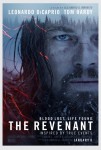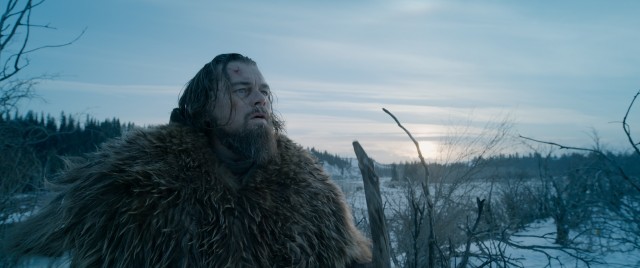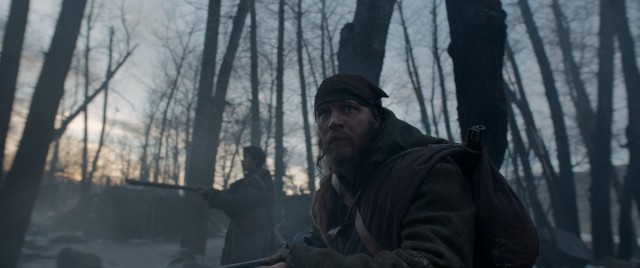The Revenant Movie Review
 |
The Revenant
Theatrical Release: December 25, 2015 / Running Time: 156 Minutes / Rating: R Director: Alejandro G. Iñárritu / Writers: Mark L. Smith, Alejandro G. Iñárritu (screenplay); Michael Punke (novel) Cast: Leonardo DiCaprio (Hugh Glass), Tom Hardy (John Fitzgerald), Domhnall Gleeson (Captain Andrew Henry), Will Poulter (Jim Bridger), Forrest Goodluck (Hawk), Paul Anderson (Anderson), Kristoffer Joner (Murphy), Joshua Burge (Stubby Bill), Duane Howard (Elk Dog), Melaw Nakehk'o (Powaqa), Fabrice Adde (Toussaint), Arthur Redcloud (Hikuc), Christopher Rosamund (Boone), Robert Moloney (Dave Stomach Wound), Lukas Haas (Jones), Brendan Fletcher (Fryman), Tyson Wood (Weston), McCaleb Burnett (Beckett), Grace Dove (Wife of Hugh Glass) |
Alejandro G. Iñárritu has wasted no time basking in the glory of his Oscar hat trick for Birdman, which won Best Picture, Best Director, and Best Original Screenplay. When he collected those awards last February, Iñárritu was already well into production on his follow-up film, The Revenant is set in the Wyoming territory in 1820. Hugh Glass (Leonardo DiCaprio) is part of a group of American frontiersmen who encounter some hostile opposition from the local Native American tribes. An early scene sees the camp on the receiving end of a surprise attack, as slung arrows bring a number of men to their death, prompting the survivors to up and leave. This is a dangerous time to live and a perilous place to be. But this existence is all that most of these fur trappers and traders have. Glass has one other thing: Hawk (Forrest Goodluck), a teenaged son he had with his late Native American wife.
A close encounter with a large, irate grizzly bear brings Glass to the brink of death. His men, grateful for the many times he's saved and guided them, do what they can to treat his wounds, but the situation is bleak and Glass is in no condition to make the hilly trek to the next stop. He is left behind with Hawk and two other men: the outspoken, short-fused John Fitzgerald (Tom Hardy) and the young and good-hearted Jim Bridger (Will Poulter). They vow to keep Glass safe and warm and give him a proper burial if it comes to that, as most expect it soon will.
Instead, Glass is left for dead and has the one thing of meaning taken from him. Now, he fights not just for his survival with mobility-inhibiting and life-threatening wounds from the mauling, but also vengeance for the circumstances of his abandonment.
The Revenant extends DiCaprio's long streak of making prestige films with respected directors. While he has developed a special bond with Martin Scorsese over the past fifteen years, there's hardly a well-regarded active auteur left with whom DiCaprio has not collaborated. Iñárritu, whose pre-Birdman credits include Babel and Biutiful, certainly fits the bill.
The worst you could say about Birdman was that it was gimmicky: designed to look like one feature-length continuous take unfolding in something resembling real time. The satirical original script took aim at Hollywood's superhero obsession and at actors' never-ending quest for artistic immortality. It was not among my favorite films of 2014, but there was undeniable cinematic skill on display. Reuniting with his director of photography Emmanuel Lubezki (who accepted Birdman's fourth Oscar win), Iñárritu this time applies his cinematic virtuosity to a presentation less showy and a story more universal.
As countless other critics will tell you, The Revenant resembles a Terrence Malick film, with its sparse use of dialogue, dreamlike atmosphere, and extensive reliance on nature shots. The cheats do not matter much because you are swept up in this glorious vision of a cold, harsh past where meals are wherever you can find them and shelter could very well be inside the carcass of a horse. Filmed in Canada, Montana, and Argentina without the use of artificial light, The Revenant is a visual feast. It is also a dramatic triumph, its taut and somewhat familiar story being more than enough to deeply invest in.
DiCaprio may be increasingly known for his failure to win an Oscar despite his evident taste for serious year-end fare and first-rate filmmakers. That losing streak is almost certain to be ended in February, this film and this year being the obvious vessels to recognize not just a fearless, committed, and physical performance full of snot and beard but a body of work over the past quarter-century seemingly unrivaled by any other actor.
In the deuteragonist role, Tom Hardy might pick up his first Oscar nomination, something many have seen coming in the years since he was embraced by Christopher Nolan and other notable directors on either side of the Atlantic Ocean. Poulter is good in a project that's distant from his past credits. Third-billed Domhnall Gleeson is good enough in his sporadic role, which virtually guarantees him two Best Picture Oscar nominees this year (along with Brooklyn) and a presence in four of the year's most acclaimed films (with Ex Machina and Star Wars: The Force Awakens) without being terribly noteworthy or conspicuous in any of them.
The Revenant is an improvement in virtually every way over Birdman, but that doesn't mean you should expect Iñárritu to repeat his Picture, Director, and Screenplay wins. There are a few better films out there which are strong and undivisive enough to cite as worthy winners without invoking the Academy's unspoken "too much, too soon" logic. In the meantime, this film is poised to do good box office business despite its long runtime and unflinching content plus something resembling direct competition in Quentin Tarantino's The Hateful Eight.
|
Related Reviews:
DVDizzy.com | DVD and Blu-ray Reviews | New and Upcoming DVD & Blu-ray Schedule | Upcoming Cover Art | Search This Site
DVDizzy.com Top Stories:
In Theaters: Joy • The Hateful Eight • The Big Short • Anomalisa • Creed • Spotlight • Brooklyn • Room • Bridge of Spies
Leonardo DiCaprio: The Wolf of Wall Street • J. Edgar • Body of Lies • Django Unchained
Tom Hardy: Lawless • Mad Max: Fury Road • The Dark Knight Rises • The Drop
Domhnall Gleeson: Ex Machina • Harry Potter and the Deathly Hallows, Part 2
The Water Diviner • The Tree of Life • Apocalypto
Text copyright 2015 DVDizzy.com. Images copyright 2015 20th Century Fox, Regency Enterprises, Ratpac Entertainment.
Unauthorized reproduction prohibited.

